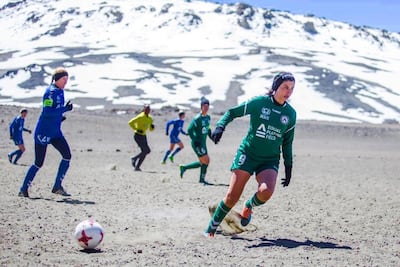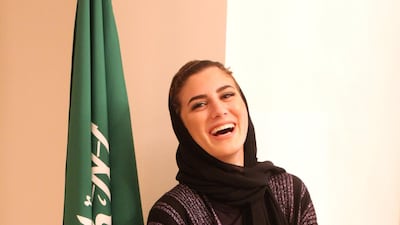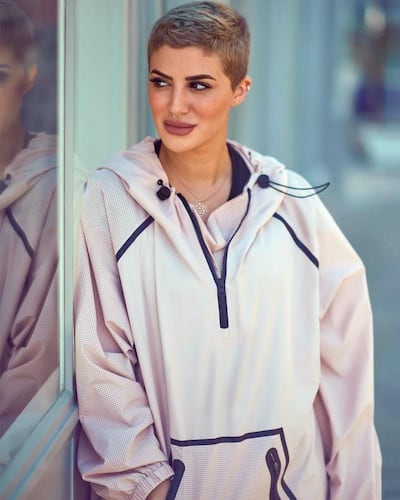In all the excitement over Saudi Arabia’s ambitious transformation plans when it comes to women’s rights – including being able to drive and to enter sports stadiums for the first time – it’s easy to overlook the reality of backstories like Saja Kamal’s.
Kamal has spent more than two decades nurturing and sustaining a dream to play on a Saudi women’s football team, but without any discernible way to achieve it.
With talk that a team could become a reality soon, a future that wasn’t previously possible is now tantalisingly close.
“People actually have an aim and have goals and work their way towards them, and I’m just kind of floating around trying to figure out what I can make happen,” says 28-year-old Kamal, speaking over the phone from her home in Riyadh.
Since falling love with the sport at the age of 4, Kamal had to play wherever she could, often on unofficial teams, scrabbled together, with coaches or without, not knowing whether any of her efforts would lead anywhere. She is joined by countless girls and women attracted to a variety of disciplines.
“It’s a lot of lost talent and shattered dreams,” she says. “It’s really sad because I get a lot of girls who message in and say, ‘Where can I play basketball, where can I go horseback riding, how did you get access to all these things, what do I do’? And I literally have no answer for them.”

Kamal, who works as a senior consultant for PwC Middle East in Dubai, but remains based in Riyadh, will today speak in the emirate about her experiences, as part of Ladies with Zest, a series of non-profit events and talks that celebrate entrepreneurs, activists, philanthropists, influencers and women who break boundaries.
Kamal got further than many women in Saudi because, growing up, her parents not only encouraged their daughters in education and travel but they supported her football ambitions from that first match.
“I remember feeling utter freedom the second the ref blew the whistle for the scrimmage,” she says. “And I could just run and be me for my game and not for what I looked like or what my gender is or how old I am.”
Growing up on an Aramco compound in the Eastern Province while attending a Saudi school, Kamal was torn between two cultures. Yet it was on those Aramco grounds that she could play the sport she loved freely – unlike her counterparts outside.
As a teenager, her father sent her and her sister to school in Bahrain, and during that time she endured a two-hour daily commute, but was able to join the Arsenal football school and become a right-forward.
After high school, she headed straight for the United States, spending five years studying for her bachelor's and then a master's degree – in politics and project management – and also playing her sport officially on the Northeastern University's women's teams.
When she returned, she spent five years working at Aramco, and even started her own team, but this fell apart after two years. There were other teams along the way that carried the Saudi flag, but couldn’t say the country’s name, gathered up ad hoc whenever there was an event to attend and an actual, official team to play.
“We played the first-ever GCC tournament in 2003; we played against the Jordan national team, the Iraq national team, the Palestinian national team even,” she says.
In recent years, Kamal has become involved with the NGO Equal Playing Field, which is focused on empowering girls and women to get involved in sport. That is how she came to be part of a 30-member crew of professional football players who trekked to 5,729 metres last year to set a Guinness World Record by playing the highest altitude football match in history. The pitch was composed of volcanic ash and marked out by flour – on top of Mount Kilimanjaro.
The 90-minute game, equivalent to six hours in regular conditions, was followed up this month by another destination game, this time at the Dead Sea in Jordan. Although a back injury meant she couldn’t play, Kamal supported her teammates and did the commentary for the match, which aimed to set a record for the lowest altitude game.
Kamal, who has also modelled and driven a race car, is nonchalant when she speaks about the whispers and judgements she has experienced.
Yet, after studying in the US and living in Dubai, through consulting work that led to meetings with Saudi ministries, she became convinced that it would be better to get involved directly than watch things unfold from afar. “In the past, I did just want to be out of there so I could be me and not have to worry about all those limitations,” she says. “But now I kind of want to give back and see if we can make change.”
Ladies with Zest is today at 11am at Cove Beach, next to Jumeirah Beach Hotel, Dubai. For more information email dani.wilson@csprgroup.com or go to @ladieswithzest on Instagram
____________________
Read more:
Sass Brown: Countering consumption with a new-look approach
Adult acne: what causes it and how it can be treated
Yoga tips and tricks for ages one to 100
____________________


